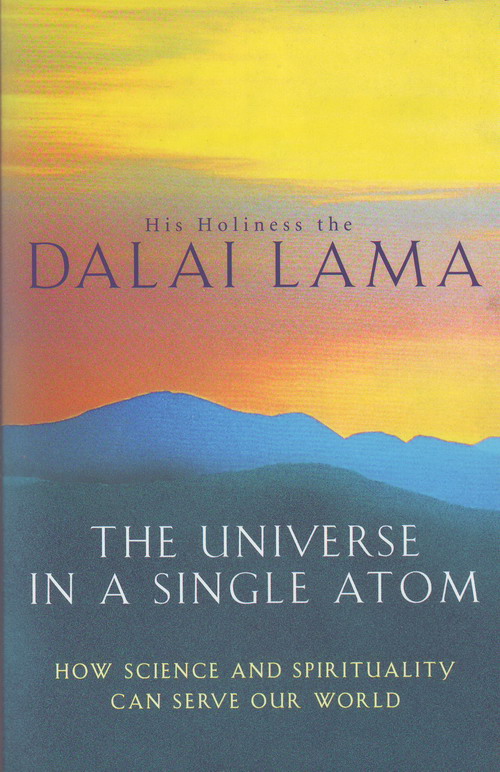 The Universe in a Single Atom by the 14th and current Dalai Lama, Tenzin Gyatso, is a book about the many overlapping parts of Buddhism and modern scientific inquiry. This makes the fourth book I have read from Mr. Lama. The Art of Happiness, In My Own Words, and How to See Yourself As You Really Are being the other three titles. All of them are interesting, especially for a Westerner from the Christian tradition.
The Universe in a Single Atom by the 14th and current Dalai Lama, Tenzin Gyatso, is a book about the many overlapping parts of Buddhism and modern scientific inquiry. This makes the fourth book I have read from Mr. Lama. The Art of Happiness, In My Own Words, and How to See Yourself As You Really Are being the other three titles. All of them are interesting, especially for a Westerner from the Christian tradition.
I was inspired to read this one after seeing a quote from the Dalai Lama that I thought was particularly intriguing thing for a religious leader of his stature to say.
“If science proves some belief of Buddhism wrong, then Buddhism will have to change. In my view, science and Buddhism share a search for the truth and for understanding reality. By learning from science about aspects of reality where its understanding may be more advanced, I believe that Buddhism enriches its own worldview.”
Many years ago, a statement like that would have seemed like admitting some kind of defeat. You don’t hear of very many Western religious leaders actively seeking empirically truthful answers to the questions science poses. Not surprisingly, I’ve never heard one imply that if the empirical truth they found contradicted what they believed, then their belief would have to change. I haven’t met everyone. Maybe spirituality in the West, and Christianity in particular, are developing a thriving tradition of this kind. But if so, I haven’t heard about it yet. Given my context, that quote was a peculiar one.
When I bought the book, I didn’t know it was so heavily focused on Buddhism. I wish I had a slightly better understanding of the Buddhist concepts that are discussed because I think the comparisons he draws with science could be more easily appreciated. But, with the heavy emphasis on Buddhism, I found that much of the reason I was drawn to the book in the first place was satisfied. I was curious what kind of religious tradition would allow a major leader to so confidently assert that what he believes could be wrong. A book about science and spirituality (in a general sense) wouldn’t have done that, and it wasn’t what I found so interesting.
The reason science and Buddhism seem more complementary with science than other world religions is Buddhism’s long tradition of inquiry and speculation. Not that they are bedfellows, exactly. “By taking this personal journey into science, I suppose I have stuck my neck out”, Gyatso says. But the long tradition of personal inquiry and speculation is the highest order:
“in Buddhism scriptural authority cannot outweigh an understanding based on reason and experience. In fact the Buddha himself, in a famous statement, undermines the scriptural authority of his own words when he exhorts his followers not to accept the validity of his teachings simply on the basis of reverence to him.”
You can immediately see a complementary element there. What can be clearly observed outweighs any interpretations of ancient texts. Another similarity comes as Buddhism places the foundation of absolutely everything within the framework of cause and effect. This is not so different from science which wonders why such and such happened, and what will happen next.
Where science and Buddhism part ways tends to be less over facts and more what counts as ‘observation’. As Gyatso says, “Although the basic emphases on empiricism and reason are similar in Buddhism and science, there are profound differences concerning what constitutes empirical experience and the forms of reasoning employed by the two systems.”
It is in these conversations that Gyatso delivers a critique of some of his own faith’s fundamental principles, without a hint of defensiveness. He also delivers a humble critique of science, mostly concerning this concept of whether one’s observation of their own consciousness is valid empirical evidence of anything. Because while science and Buddhism both prize empiricism, Buddhism seeks an empirical understanding of consciousness from the first person perspective, and science does the same from a third person perspective. Although many of Buddhism’s mental training exercises and traditions fall in line with the scientific understanding of the mind, science generally does not accept the contribution.
Whether that’s right or wrong is hardly for me to know.
With much of my past spiritual reading coming in the form of a defensive apologetics response to science, this was really a breath of fresh air. Even from the perspective of arguing for a creator (which he is not) Gyatso seems to be speaking a language more fundamentally familiar to science: one of observation, curiosity and and inquisition. Not “did God create the world 7000 years ago or billions of years ago?”, rather “could any god create the world.”
In Conclusion
This was a really interesting read from the cultural standpoint. It was so focused on Buddhist traditions that it’s hard to imagine it being terribly useful to helping most people in the West in appreciating the parallels between spirituality and science. At least without a bit of experience with Buddhist concepts. The ease with which the Dalai Lama can discuss these topics without becoming defensive could be a result of that faith tradition simply not being deeply in conflict with scientific thought. But, nonetheless, I think religious leaders in other traditions could take some queues from the patience, tact and humility displayed throughout the book.

Recent Discussion